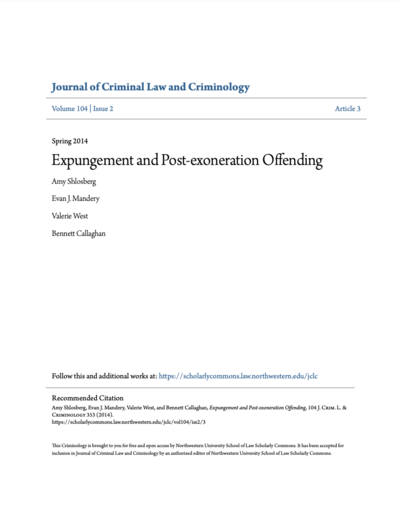Expungement and Post-exoneration Offending
Journal Article
Clean Slate
Topics:
Collateral Consequences
Criminal and Juvenile Records
Records Clearance, Expungement, and Sealing
Reentry population:
Adults
Date:
Source:
Journal of Criminal Law & Criminology
Expungement and Post-exoneration Offending
This is Article, from the Journal of Criminal Law & Criminology, is the second Article stemming from a study of the post-release behavior of wrongfully convicted individuals.
Utilizing data on exonerees compiled from the Center on Wrongful Convictions at Northwestern University, the study tracks the behavior of 118 exonerees following their releases and examines the effects of more than twenty variables on their post-release criminality. The authors present their findings on the ameliorative effects of expungement on post-exoneration offending.
Expungement would seemingly be an obvious remedy for wrongfully convicted individuals, but in fact, almost one-third of exonerees do not have their records purged. The authors found that a failure to expunge was a significant predictor of postexoneration offending. This relationship was strongest for offenders who had not committed an offense prior to the one for which they were wrongfully convicted. The problematic impact of failing to expunge is generally consistent with labeling theory, as are the findings regarding the effects on exonerees without prior records, which are supported by research suggesting that labeling effects are strongest for first-time offenders.
The universe of exonerees is small; their data is not drawn from a sample. Thus, the authors present their observations about the relationship of postrelease offending and expungement with caution. Nevertheless, the data suggests that expunging exonerees’ records is defensible, not only as a matter of fundamental fairness but also on public policy grounds.




